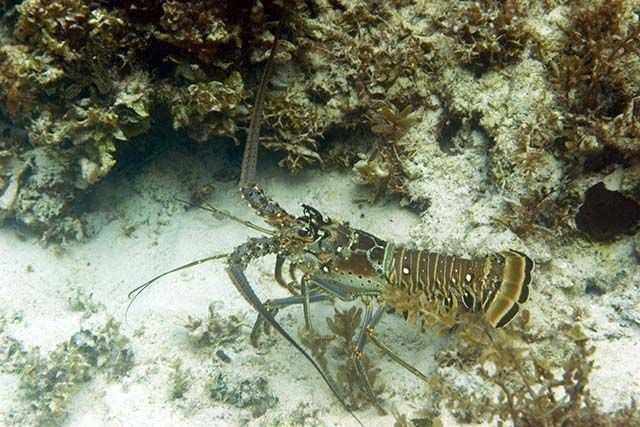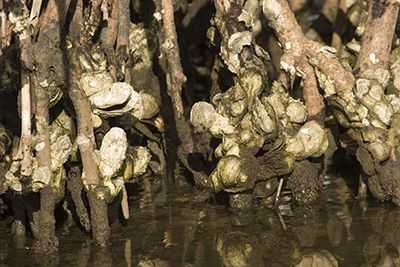
By Ellie Van Os
At the Florida Oceanographic Coastal Center, we are passionate about invertebrates. Our programming includes invertebrate touch tanks that are tended throughout the day by attentive and informative volunteers. But our enthusiasm goes beyond just information and the sensory experience. As a research and educational facility, we recognize their invaluable role in the food web. We spearhead oyster restoration efforts and support the Florida Fish and Wildlife Conservation Commission harvest regulations.
There are three types of invertebrates that come to mind when we think of harvesting. The spiny lobster, “bugs”, epitomizes the harvest of crustacean species that are collected for food. They are the reason for the difficulty in finding lodging in the Keys during the week of the mini-season in July and the first couple of weeks after the full season opens in August. They are indisputably delicious and fun to catch, but precautions during their harvest will help ensure the health of the population. Besides requiring a Florida Saltwater Fishing License, a Spiny Lobster permit is also required for an additional $5. Be mindful of the minimum size and also the gender, since harvest of or even handling of egg-bearing females is prohibited. It is also strongly recommended that females and undersized animals not be removed from the water and be returned to the place they were snatched from in order to minimize their vulnerability.
In fact, although the harvest dates and limits differ, the other crab-like species that Floridians harvest (except shrimp) all carry with them heavy fines if caught with an egg-bearing female. Educate yourself on all of the regulations and closed periods at http://myfwc.com/fishing/saltwater/recreational/rules-by-species. Also be aware of unexpected rules, some of which include: giant land crab harvest is prohibited along federal, state and county-maintained roads; closure dates for the harvest of blue crabs vary significantly depending on your location in the state; and, the harvest limits for shrimp require that you leave the heads on. It is illegal to possess a whole stone crab and although the State used to promote the removal of only one claw some research indicates that with the removal of both claws, the crab is limited to a more herbivorous (algae) diet, promoting faster re-growth. Furthermore without a claw to defend her against randy males, there is apparently more mating, which is good for the population.

The second group of invertebrates, again harvested for food, is the mollusks. Do not even think about taking queen conch as their harvest is strictly prohibited due to wanton over harvesting last century. But there are areas that are open for the taking of hard clams, oysters and scallops. These bivalves (two shells) pass large quantities of water over their gills to filter out not only oxygen but bits of food, a method that can concentrate pollutants and harmful algae in their tissues. Be sure to check out the state website http://shellfish. floridaaquaculture.com/seas/seas_statusmap.htm for safe and open harvest areas. Our oyster restoration program, FL.O.O.R., which stands for Florida Oceanographic Oyster Restoration, is not as much about their worth as a food source as it is about their priceless value as fisheries habitat and water cleansers.
Other invertebrates that are harvested in the state are not for consumption but for the popular saltwater aquarium trade. Most people do not realize that these too are regulated and you need a recreational saltwater fishing license as much for them as for a gray snapper. It is extremely important to be aware of all regulations. While many people know that it is illegal to take hard and soft coral, most are not aware that it is also prohibited (even with a saltwater license) to collect horseshoe crabs, live rock, octopus and Bahama starfish. As popular as urchins, sponges and anemones are for aquariums, the State has taken a proactive stance in protecting these animals from well-meaning but oftentimes greedy collectors. As always, enjoy our beautiful Florida resources but if you plan to harvest any of them myfwc.com remains the most accurate resource for current regulations and you can rest assured that our State biologists and enforcement officers are looking out for our invaluable invertebrates.
Ellie Van Os is Director of Education and Exhibits for the Florida Oceanographic Society. She can be contacted at evanos@floridaocean.org and by phone at (772) 225-0505 ext. 113.